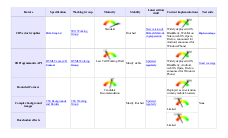Three months have already passed since the last update to my overview of Web technologies for mobile applications, and thus I have just released the quaterly update to Standards for Web Applications on Mobile.
The document has the latest information about the status of specifications, their expected evolution, the state of their accompanying test suites. In the past 3 months, the Open Web Platform has seen among other things the arrival of 8 new public working drafts (with Web Intents, multimedia integration and storage quota mangement particular highlights).
Next month (October 15), another sessions of our on-line training course: Mobile Web 2: Applications will start, and will cover a number of the technologies described in the document: don’t miss it!






